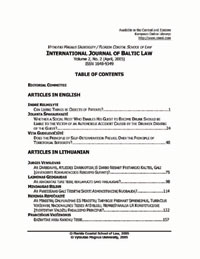Ar darbdavys, atleidęs darbuotoją iš darbo nesant pastarojo kaltės, gali įgyvendinti konkurencijos ribojimo sutartį?
Whether employer can enforce covenant not to compete after terminating employment agreement absent employee's fault?
Author(s): Jurgis VenslovasSubject(s): Law, Constitution, Jurisprudence
Published by: Florida Coastal School of Law and Vytautas Magnus University School of Law
Keywords: employer; enforce; covenant not to compete; terminating; employment; agreement; employee; fault
Summary/Abstract: Employee’s covenant not to compete is a contractual provision that controls a very sensitive field of social life, creating conflict between important constitutional principles- freedom of contract and right to have a job. There is a gap of statutory regulation of the question in Lithuania and this leads to different interpretations. Systematic analysis of statutes that regulate such field of relationship, place of covenants not to compete in Lithuanian legal system and comparative information about laws of other states has led to the conclusion that there is no relationship between enforceability of employee’s covenant not to compete and the grounds of termination of employment agreement, so the employer is free to enforce such contractual obligations of employee even after his own decision to terminate employment agreement without any fault from the side of employee. Validity of covenants not to compete and enforcement of such covenant should be subjected to the substance of the covenant itself. There has to be the balance between the interest of the employer and the employee- employer’s interest has to be protected without making unnecessary restrictions for employee. Restrictions have to be limited in scope, territory, duration and employment position. Employee has to get fair compensation to outweigh inconvenience created. As Lithuanian Labour code contains no provisions regulating covenants not to compete, but at the same time forbids the possibility of agreements creating more restrictive obligations for employee than those in the Code itself, such covenants would have more legal authority classifying them as provisions of contract law. Such classification ties validity of covenants not to compete to statutory grounds provided in Civil code and excludes the possibility to rely on the forms of termination of employment agreement questioning the enforcement of non- competition clause. The same conclusion with some minor exceptions can be made reviewing the laws of different foreign states: courts look into the details of the agreement and the reason of termination of employment agreement is important considering the validity of non- competition clause only when this is expressly stated in the agreement. And this separation is not against the principles of Lithuanian Labour code, because the code excludes the possibility for employer to fire an employee arbitrary, because the employer’s decision to terminate employment agreement absent employee’s fault is limited to special circumstances and no abuse of rights of the employer is tolerated. Such regulation leads to the balance of interests of the parties of employment relationships. This leads to the conclusion that the hypothesis of the thesis that employer may enforce covenant not to compete even when he terminates employment agreement without the fault of employee is confirmed. There is no relation between the enforceability of such covenant and statutory provisions regulating ...
Journal: International Journal of Baltic Law
- Issue Year: 2005
- Issue No: 2
- Page Range: 75-97
- Page Count: 23
- Language: Lithuanian

